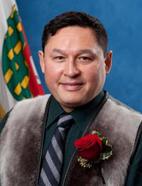Thank you, Mr. Speaker. I would like to recognize a couple of special people. I think that I have a couple of grandchildren in the gallery, Scarlett and Tucker are both young babies, and also Alyssa. Alyssa, actually, is doing amazing things. She is working with organizations like the Edmonton Eskimos. There is so much debate about whether we are Inuit or Eskimo and what that means to us. Alyssa is actually helping with that in what she does to educate people and educate people properly. There are so many misconceptions of the word, and even through this government. There is so much good work that the government does, and sometimes it's brought down negatively. Alyssa is one of the people who actually stabilized that, and I appreciate the work that she does, so I'd like to recognize Alyssa. Also, my daughter Maddy who is there. It's good to see kids around here.
Sometimes, we spend so much time being serious. We can't even sit down and have a conversation and laugh. I think we need to incorporate that into the work that we do here, especially with the advice that we get from all the professionals. I believe my mother, Helen, is in the gallery. My wife, Yvonne.
Mr. Speaker, family is so important for me. It's been the foundation of everything I do, whether it's here at home or working on projects around this world. My life before coming here was working on projects around this world educating the general public, and also advocating for Inuit in our drive to self-determination, and without family, I could do nothing of that, Mr. Speaker.
I'm grateful for my parents, who actually grew me up properly. I really give credit to my mom and dad for helping me out at a young age. They sent me away from Paulatuk when I was 15. They're like, don't come back until you have a good education or something. I still don't know what that means today, but I appreciate it. I'd like to welcome my family. Mr. Speaker, without them, I don't know where I would be today. Thank you, Mr. Speaker.
